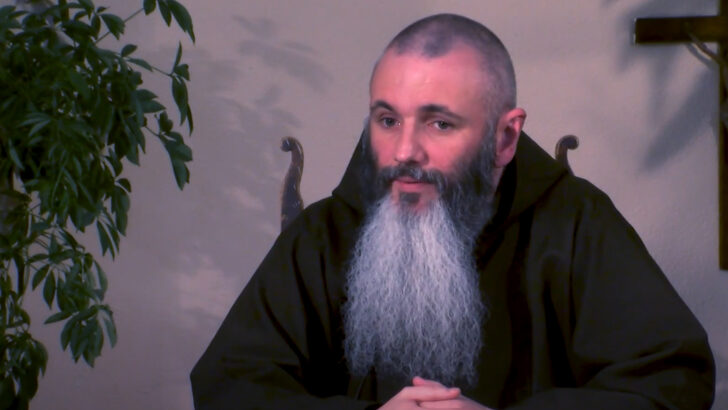Most of us live, right now, in a world of storms. Never in history has the human being been under so much pressure from so many directions all at once. The world seems to be on fire as political systems are rocked, and new conflicts and wars are breaking out… The individual person is put under a constant pressure to succeed, to be perfect, to have it all…” With these words Bro. Richard Hendrick starts his latest book, Calming the Storms: Meditation as a Path to Inner Peace and Happiness.
In a conversation with The Irish Catholic, the author said, “What people want is what they’ve always wanted, peace. The deep peace that this world cannot give. The peace that comes from living in right relationship with God, with one another and with all of creation. That’s what’s at the heart of the hungers of everybody, even if those hungers are misplaced or are fulfilled in difficult or problematic ways. There is a hunger for union with God and for peace with one another.”
Purpose
Talking about the purpose behind his new book, Bro. Richard Hendrick told this paper, “The previous work, Still Points, comes out of the same idea, which was to begin to introduce people to the Christian contemplative tradition, particularly people who may have had interest in the kind of modern mindfulness but wouldn’t have known that the Christian contemplative tradition exists in such steps. So, the idea would be to allow people to recognise that that’s there as a possible way to explore our faith and prayer practice as well.”
The contemplative tradition, often associated with monastic life, is just as accessible to those immersed in busy family or work lives, explains Bro. Richard. The Irish friar shared insights on how living deeply in the present moment is the core of every spiritual practice, “Whether it’s a parent tending to children or a professional at work, being fully present in each moment opens the space for encountering God.” This echoes the words of St Elizabeth of the Trinity, a 20th-century Carmelite, who wrote: “It seems to me that I have found my Heaven on Earth, because my Heaven is you, my God, and you are in my soul.”
Tradition
Bro. Richard emphasised that this call to presence is an integral part of the contemplative life, which the Church’s mystical tradition has long nurtured. He lamented that contemporary Christian practice often places the focus far from this aspect, concentrating more on liturgy and Apostolic life. He believes it is crucial for the contemplative life to be reintroduced at all levels of religious formation, from parish communities to individual spirituality: “It needs to be taught more widely… Traditionally, the monasteries were the places of deep spiritual practice, but they were also meant to be petrol stations for the ordinary faithful as well. Where people could go to receive deeper instruction and refuel their spiritual journey.”
In losing touch with this contemplative tradition, Bro. Richard argues that Christians have also lost a vital aspect of their spiritual journey. “In separating ourselves from contemplative space, one of the things we’ve done is lose the ability to know that this is meant to be part of the journey of every baptised Christian.” He suggests that by reintroducing the contemplative tradition, the Church can offer people a way to connect more deeply with their faith, particularly in a world filled with distractions and anxieties.
Resonate
Bro. Richard’s reflections resonate strongly with certain biblical teachings. In Matthew 6:22-24, Jesus speaks of the importance of having a clear eye, which fills the whole body with light. This metaphor of clarity and light can be understood as a call to mindfulness and presence – qualities that are at the heart of the contemplative life. Similarly, in Matthew 6:25-27 and 34, Jesus tells his followers not to worry about their lives, reminding them that life is more than food and clothing. He urges them to trust in God’s providence, noting that even the birds in the sky are cared for by the heavenly Father. This message of trusting in God and living in the present moment is central to Br Richard’s teachings on meditation and contemplation.
In Calming the Storms, Bro. Richard writes: “The practice of deeper meditation teaches us what we may become in God through a deepened awareness of His presence in each succeeding moment and at deeper and deeper levels.” This practice, he argues, leads to a transformation in how we relate to ourselves, to others, and to all of creation. It allows us to “become an empty bowl to be filled with grace” and to experience God’s presence as love. This awareness of God’s presence in us, he suggests, naturally extends to an awareness of God’s presence in others.
For Bro. Richard, meditation is not simply a practice of inward reflection but a means of fostering compassion and wisdom in our relationships with others. “Eventually, our Christian mindfulness, through the cultivation of intentionality and the practice of inner attention, leads us into understanding how we must relate to ourselves and to all other creatures from wisdom and with compassion.” This is a call not only to personal peace but to peace with others and with the natural world.
Bro. Richard’s focus on the contemplative life as a path to peace and renewal is also linked to his understanding of the Church’s ongoing need for reform. He acknowledges that the Church is always in a process of renewal, driven by the work of the Holy Spirit. “I think the Church is always in need of renewal and always has been, since the beginning,” he says. He believes that this renewal involves a return to the authenticity of the Gospel and the teachings of the Apostles. This was a central theme in the life of St Francis, who received the call from Christ to “rebuild my Church.”
Perfect time
Bro. Richard reminds us that there has never been a “perfect time” within the Church. It has always experienced both light and darkness. He references St Augustine, who noted that while the Church is holy in its head, Christ, it can be sinful in its members -humanity. The journey of renewal, Bro. Richard suggests, involves a constant attempt to reform ourselves, to renew ourselves in God’s grace, and to listen to the promptings of the Spirit.
This process of renewal, he argues, must begin with deep listening and discernment. It is in the silence of contemplation that we can hear the voice of God and begin the work of reform. For Bro. Richard, the contemplative life is not just for monks and nuns but for all Christians who seek to live in deeper relationship with God, with one another, and with all of creation.
The Christian contemplative tradition offers a way to ‘calm’ the storms of modern life – a way that is grounded in stillness, presence, and the awareness of God’s love. As Bro. Richard writes, “This is the knowing that we are called to through stillness and silence. The knowing of God’s presence in our very being as love, and it leads us to an awareness of God’s presence in everybody else too.” In a world filled with anxiety and conflict, this message of peace and presence is one that many are longing to hear.
Calming the Storms is a call to return to the deep spiritual practices that have sustained Christians for centuries. It is an invitation to rediscover the contemplative life, not as a distant monastic ideal but as a practical and accessible path for all who seek peace during life’s storms. Through meditation, mindfulness, and a deepened awareness of God’s presence, Bro. Richard offers a way to find the peace that “this world cannot give”.


 Renata Milán Morales
Renata Milán Morales
